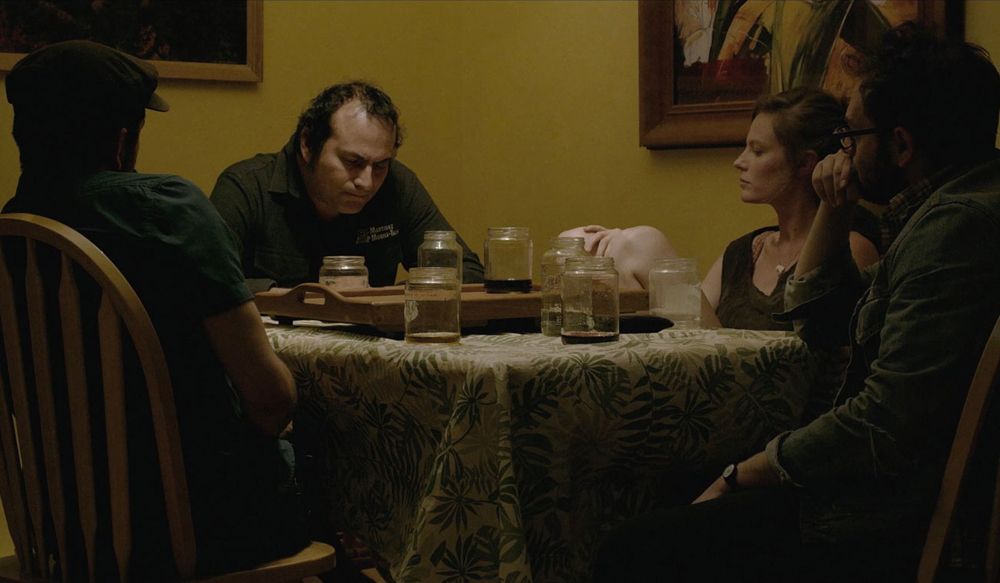It’s likely no one was happier to be at the Tribeca Film Festival than the crew behind “Actor Martinez” because it meant they had escaped their world premiere at Rotterdam in one piece.
“In Rotterdam, there was a lot of anger in the audience…the Dutch did not like the movie. I’ll tell you,” recalled the film’s co-director Nathan Silver, before turning to Arthur Martinez, one of his co-conspirators who stars in the film. “Do you remember that one woman?”
“Yeah,” says Martinez. “Somebody got mad at me about the pickle jars. She wanted to know if that was true? Did we actually drink out of pickle jars? She wouldn’t talk to me after I said, ‘Yes, they were real.’”
While the reaction could be considered extreme – and not even to one of the more incendiary moments in the lightning rod co-directed by Mike Ott and Nathan Silver, you don’t make a movie like “Actor Martinez” without expecting a response. An experiment in the best sense of the word, “Actor Martinez” brings together two of the more exciting filmmakers to emerge in recent years with wildly different styles – Ott, who often creates intrigue through carefully crafted compositions and curiosity-inducing restraint, and Silver, who thrives on chaos, diving into conversations between characters as if putting the audience in as a referee for a cage match – to blur the lines between reality and fiction as they create a film around Martinez, who goes by his real name on screen and draws upon his real-life disposition as a part-time tech repairman who would love to devote himself full-time to acting.
Although aesthetically “Arthur Martinez” may lean more towards Ott in its deliberate, observational way of capturing Martinez as he loses his sense of self during the making of a film mimicking his life, the provocation of it is clearly a shared responsibility, asking who does a story belong to – the storytellers or those characters who exist inside of it – when it starts to take a life of its own. Naturally, awkward laughs emerge from the uncomfortable situations Ott and Silver wind up putting their cast and crew through, showing Arthur act out a romantic relationship with a co-star he isn’t exactly enamored of (“A Teacher”’s Lindsay Burdge, also playing a variation on herself), eventually having to navigate a poorly planned sex scene, among other landmines. However, in putting the backstage drama in the foreground, the film offers a sharp analysis of the often unexpected and unstable circumstances that create art as much as the intent.
Having survived their North American premiere in New York the night before (barely), Silver, Martinez and Burdge spoke about how the film was born out of Martinez’s real desire for a juicer role, what it’s like to create a different version of yourself for the screen, and dropping a grenade in the lap of audiences.
How did this come about?
Nathan Silver: The Denver Film Festival. It was all Arthur’s idea.
Arthur Martinez: Yeah, I still have a hard time taking credit for that. Originally, I needed a film made [because] I wanted better kinds of roles because my stereotype in film is really bad. I had known Mike for five years and I asked him [at the Denver Film Festival] and Nathan happened to right there and they were like, “Okay.” No kidding. They killed it.
Nathan Silver: You were scared of having it happen so quickly. You wanted us to spend more time.
Arthur Martinez: That is true because originally you guys wanted to shoot in February and I couldn’t make that work. But you’re right. It was an avalanche for me at that time.
Lindsay Burdge: You brought it up while you guys were driving or just at a party?
Arthur Martinez: They were walking by at a party and I said, “Hey guys. What would it take to make a movie?” And bam. We were married.
Nathan Silver: Mike and I had been talking about collaborating on something. We didn’t know what it was going to be, but then as soon as Arthur approached Mike, Mike pulled me into it and said he wouldn’t direct it unless I was on board.
Arthur Martinez: They did a really good job together. My initial concern was [with] two directors, if we have a conflict, yikes. But you guys were like peas in pod. They were great together.
Lindsay Burdge: It was like bad cop, bad cop.
Arthur Martinez: [laughs] That is so awesome. I wish we would have said that on camera.
Lindsay Burdge: It’s definitely not true, though. [Nathan] was definitely the good cop. Let’s be real.
Nathan Silver: That should be the name of the piece, right? “Bad cop, bad cop.”
What the schedule was like on this? Because there’s a running analysis of the scenes in the film within a film, would you shoot a scene and talk about it after, all on camera?
Nathan Silver: We’d have those sit-downs at the end of the day. There were 5 or 6 where we would have the drinks on the table and be discussing what was going on, but that didn’t occur every day. Most days we sketched in what we were going to do, then out of those sketches, we would develop scenes that we wanted to shoot. We allowed ourselves a lot of freedom in the schedule. It wasn’t like we have to do this, that and the other thing to make our day. It was more about how are we going to find a movie in all of this?
As we speak, Arthur is wearing the Mobile Tech t-shirt, the same as in the film. How much did you want to involve your true self in the film?
Arthur Martinez: I didn’t understand how much I was giving. I didn’t know it was going to be like everything. This was a pre-existing business and still is. I’m not sure what to do with that after this. I might just sell shirts. Everybody wants a shirt.
Nathan Silver: You’ve become a brand.
Arthur Martinez: Actor Martinez was my handle, like Facebook, everything. I already owned all of that and then it became the title and I was like fine, one more thing. But I didn’t know how far it was going. I thought I was giving a little bit and I gave everything.
Was that true of you as well, Lindsay?
Lindsay Burdge: Yeah. It was. I knew I was doing that because the outline said “Actress Lindsay Burdge flies in from New York,” and I live in LA, so for me, that was enough. It’s not me. It’s Lindsay, the one that still lives in New York. At first, it was really a big challenge and I had to find a character of myself that I could play rather than feeling like it was a documentary about me, which it wasn’t. Initially, I was pitched a narrative movie, then maybe a month before we started shooting, I got an outline that was this completely other movie, without warning or discussion, so I had to find the edge of myself that I was willing to put into the movie and that took a second. Once I did, it was really fun.
What was it like finding that opening scene in the film – of Nathan, Mike and Arthur slowly coming into focus – because that gives the entire thing its frame?
Nathan Silver: We spent a day shooting an interview with Arthur that ended up [being used] throughout most of it, right? It was just about finding what we wanted, like what kind of aspects of documentary we wanted to actually bring into the film, so [in that shot] you have the whole crew around. We figured that it might be the opening shot, but then it wasn’t during the initial edits and somehow it ended up becoming it. That pleased our cinematographer Adam Minnick because he was like, “That’s the way the movie has to begin.” He got his wish.
There are audition sequences in the film and other actors that seem like they might not have been in on what you were up to – did they actually know the context?
Nathan Silver: I don’t think anyone knew the whole thing except Lindsay, who was the only one who’d read the outlines. She had context for all of the scenes, but for instance, the Film Grind — the mixer [for actors], we staged that because we’d witnessed Arthur going to some of those events. People had a sense of what those film mixers were like because a lot of them were attendees of the event. They were a bunch of regulars.
Arthur Martinez: And they just made me talk to all of the people that I wouldn’t normally talk to.
Nathan Silver: We didn’t give them much context. Afterwards, we would. When people had questions, we would answer as best we could.
Was there a particularly crazy day on this?
Arthur Martinez: A lot of them. Probably the worst one was the rape scene or however you would describe that [sex scene with Lindsay Burdge]. That was hard. They jacked me up on that one. There were a lot of days like that.
Nathan Silver: [In Rotterdam] there were people who were furious over whether or not we exploited the actors, whether or not there was actually a movie there — there were a lot of questions that were coming up. It wasn’t like they wanted answers. They just wanted to express the fact that they were angry.
Arthur Martinez: Here [in New York], they were more used to the exploitation. They still ask the question, but they were okay with it except for the one woman [at the Tribeca premiere] I just had to tell her “No comment.” She compared us to the Stanford Prison Experiment. I couldn’t bring myself to say it.
Lindsay Burdge: Or like Stockholm syndrome also. I was like, “When is she going to accuse you?” I thought she was accusing me of becoming a guard. And I was like, I did become a guard.
Arthur Martinez: That’s why I wanted to stay out of it. I had to tell her “No comment.”
Lindsay Burdge: Poor Arthur.
Arthur Martinez: That was nuts. They still care here [in New York], but…
Nathan Silver: Not in the same way. At least here you can answer the question and they’re willing to listen.
Lindsay Burdge: I think a lot of people come away thinking that I’ve been exploited. Did you see all of the women in the audience going like, they were just like [gives a look of stunned silence] and then I felt terrible suddenly and I was like, “Oh my God, I’ve got to get out of here.” I’ll hide under a curtain. If they think that I’ve been, as [Arthur] says, essentially raped, then you’re just like, “Who are these assholes and what have they done?” I had even good friends last night coming up to me being like, “So, how are you and Nathan now? Do you talk to him?” I’m like, “Yeah. We’re making another movie together.”
Was there something that when you actually wound up seeing the film that you were surprised to see of yourself on screen?
Arthur Martinez: I didn’t know what scene we were making until it was done. Even then, I’m not sure what we did.
Nathan Silver: It’s not a pretty picture of me. Fumbling, bumbling idiot.
Arthur Martinez: In the film? Gosh. Wow. No. I love you in the film. I was really grateful when they agreed they would be in it as well. The whole damn thing messed up my head. I didn’t want to see what it was. It was very difficult for me to watch the first screening. They offered me screeners and I told them no. When we premiered in Rotterdam, it was the first time I saw it and I just had to do it because Allen McLain, a filmmaker friend, told you have to do it. You don’t have a choice, so I said, “Okay. Fine.” I didn’t understand the film. I expected it to be a lot more difficult to watch, but it wasn’t as difficult as I thought it was going to be, so it’s okay.
Lindsay Burdge: They made you look good, man.
Arthur Martinez: Yeah. I don’t know if I understand that, but it’s okay.
Lindsay Burdge: You’re a hero. You’re a good guy.
“Actor Martinez” will open on March 10th in Los Angeles at the Laemmle Music Hall and on March 17th in New York at Cinema Village. It will be available on VOD on March 28th.





Comments 2